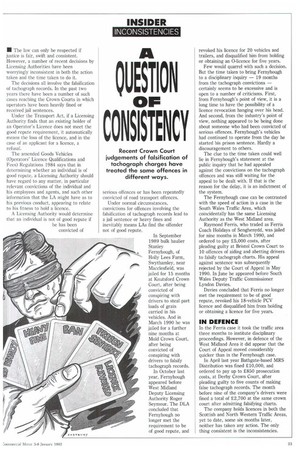Qurtam
Page 25

If you've noticed an error in this article please click here to report it so we can fix it.
ONSISTEIC Recent Crown Court judgements of falsification of tachograph charges have treated the same offences in different ways. • The law can only be respected if justice is fair, swift and consistent. However, a number of recent decisions by Licensing Authorities have been worryingly inconsistent in both the action taken and the time taken to do it.
The decisions all involve the falsification of tachograph records. In the past two years there have been a number of such cases reaching the Crown Courts in which operators have been heavily fined or received jail sentences.
Under the Transport Act, if a Licensing Authority finds that an existing holder of an Operator's Licence does not meet the good repute requirement, it automatically means the loss of the licence, and in the case of an applicant for a licence, a refusal.
The amended Goods Vehicles (Operators' Licence Qualifications and Fees) Regulations 1984 says that in determining whether an individual is of good repute, a Licensing Authority should have regard to any matter, in particular relevant convictions of the individual and his employees and agents, and such other information that the LA might have as to his previous conduct, appearing to relate to his fitness to hold a licence.
A Licensing Authority would determine that an individual is not of good repute if he has been convicted of serious offences or has been repeatedly convicted of road transport offences.
Under normal circumstances, convictions for offences involving the falsification of tachograph records lead to a jail sentence or heavy fines and inevitably means LAs find the offender not of good repute.
In September 1989 bulk haulier Stanley Fernyhough, of Holly Lees Farm, Swythamley, near Macclesfield, was jailed for 15 months at Knutsford Crown Court, after being convicted of conspiring with drivers to steal part loads of grain carried in his vehicles. And in March 1990 he was jailed for a further nine months at Mold Crown Court, after being convicted of conspiring with drivers to falsify tachograph records.
In October last year, Fernyhough appeared before West Midland Deputy Licensing Authority Roger Seymour. The DLA concluded that Fernyhough no longer met the requirement to be of good repute, and revoked his licence for 20 vehicles and trailers, and disqualified him from holding or obtaining an 0-licence for five years.
Few would quarrel with such a decision. But the time taken to bring Fernyhough to a disciplinary inquiry — 19 months from the tachograph convictions — certainly seems to be excessive and is open to a number of criticisms. First, from Fernyhough's point of view, it is a long time to have the possibility of a licence revocation hanging over his head. And second, from the industry's point of view, nothing appeared to be being done about someone who had been convicted of serious offences. Fernyhough's vehicles had continued to operate from the day he started his prison sentence. Hardly a discouragement to others.
The clue to the time taken could well lie in Fernyhough's statement at the public inquiry that he had appealed against the convictions on the tachograph offences and was still waiting for the appeal to be dealt with. If that is the reason for the delay, it is an indictment of the system.
The Fernyhough case can be contrasted with the speed of action in a case in the South Wales Traffic Area, which coincidentally has the same Licensing Authority as the West Midland area.
Raymond Ferris, who traded as Ferris Coach Holidays of Senghenydd, was jailed for nine months in March 1990, and ordered to pay £5,000 costs, after pleading guilty at Bristol Crown Court to 10 offences of aiding and abetting drivers to falsify tachograph charts. His appeal against sentence was subsequently rejected by the Court of Appeal in May 1990. In June he appeared before South Wales Deputy Traffic Commissioner Lyndon Davies.
Davies concluded that Ferris no longer met the requirement to be of good repute, revoked his 18-vehicle PCV licence and disqualified him from holding or obtaining a licence for five years.
IN DEFENCE In the Ferris case it took the traffic area three months to institute disciplinary proceedings. However, in defence of the West Midland Area it did appear that the Court of Appeal moved considerably quicker than in the Fernyhough case.
In April last year Bathgate-based MRS Distribution was fined £10,000, and ordered to pay up to £850 prosecution costs, at Derby Crown Court, after pleading guilty to five counts of making false tachograph records. The month before nine of the company's drivers were fined a total of £2,700 at the same crown court after admitting falsifying charts.
The company holds licences in both the Scottish and North Western Traffic Areas, yet to date, some six months later, neither has taken any action. The only thing consistent is the inconsistencies.
























































